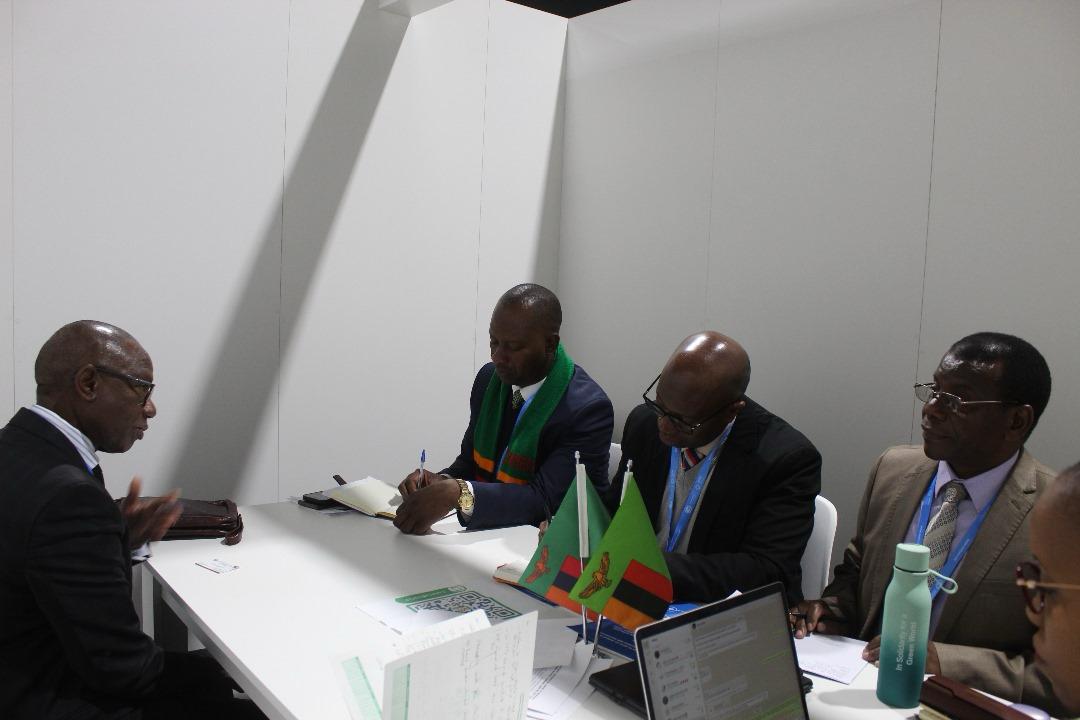
By Mary Kasoka Mwiikisa
Baku, Azerbaijan – The Government says Zambia is ready to expand its carbon market space and allow more players in the industry.
Speaking at the ongoing climate change conference (COP29) in Baku, Green Economy, and Environment Minister Mike Mposha has called on the private sector to take advantage of the favourable guidelines and enter the industry.
Mr. Mposha said this against the backdrop of the Zambia – United Nations Carbon market focus on the voluntary Carbon Market (VCM).
The Green Economy and Climate Change Bill is expected to come into force by the end of the year, and it will provide the legal basis for charging proceeds from project developers, among other benefits. Therefore, this is the best time to consider jumping on the carbon trade bandwagon.
“I am urging private sector companies to take this call seriously, and this is for both local and international entities. So far as a Country, we are yet to see many companies participate in Carbon Trading. Let me also emphasise the message of President Hakainde Hichilema on this matter, carbon trading projects must benefit the local communities who are the custodians of these forests, so as to improve their livelihood” Mr. Mposha emphasized.
Zambia is expecting to generate at least 10 projects under the UN’s new carbon market mechanism, mostly by transferring projects from the voluntary carbon market (VCM).
Zambia’s Lead negotiator on Carbon Market Negotiations under Article Six of the Paris Agreement Dr. Alick Muvundika, expressed optimism on the prospects of the benefits of carbon trading under the new development.
On the first day of COP29, the conference adopted a decision made by the supervisory body to enable project developers to carry out carbon market-related activities on the ground. This will create employment and increase revenue for the National treasury through high integrity credits which will be verifiable. Ultimately, this decision will create more benefits for Zambia whenever engaging in carbon trading related activities.
Meanwhile, Zambia Forestry and Forest Industries Corporation (ZAFFICO) needs over US$25,000,000 to realise its ambition of venturing into the Carbon Market space.
Board Chairperson Alvert Ng’andu disclosed that the company was already expanding its plantation hectarage and commenced a feasibility study to identify potential partners for carbon trading.
Dr. Ng’andu said ZAFFICO is attending finance related meetings and is focused on identifying potential partners and investors who can help actualise the plans of venturing into Carbon Trading and also seek to expand the plantation scope to help generate revenue.
“Let me also take this opportunity to appeal to communities who live near our plantations not to encroach on the plantations. As a company, it is our policy to empower communities in places where we operate, through the distribution of seedlings for tree farming and employment creation through our company, therefore working hand in hand with the communities, we can achieve more,” Dr. Ng’andu added.
At least, five Zambian-based VCM projects could be transitioned to the new mechanism under Article 6.4 of the Paris climate agreement next year.
Carbon trading, also known as carbon emissions trading, is the use of a marketplace to buy and sell credits that allow companies or other parties to emit a certain amount of carbon dioxide.
Countries that reduce their emissions more than they had pledged receive credits that can then be sold to countries where it is costly to cut greenhouse gasses.
The value of the global carbon credit market has experienced exponential growth, reaching a historic high of US$909 billion in the past year. This surge underscores the increasing significance of carbon trading as a mechanism for mitigating climate change and fostering sustainable development worldwide, as espoused in the United Nations Framework Convention on Climate Change (UNFCCC report of 2023).
